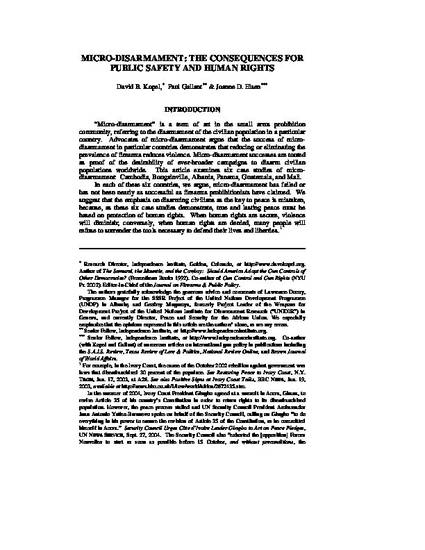
Article
Micro-Disarmament: The Consequences for Public Safety and Human Rights
UMKC Law Review
(2005)
Abstract
“Micro-disarmament” is a term of art in the small arms prohibition community, referring to the disarmament of the civilian population in a particular country. Advocates of micro-disarmament argue that the success of micro-disarmament in particular countries demonstrates that reducing or eliminating the prevalence of firearms reduces violence. Micro-disarmament successes are touted as proof of the desirability of ever-broader campaigns to disarm civilian populations worldwide. This article examines six case studies of micro-disarmament: Cambodia, Bougainville, Albania, Panama, Guatemala, and Mali.
In each of these six countries, we argue, micro-disarmament has failed or has not been nearly as successful as firearms prohibitionists have claimed. We suggest that the emphasis on disarming civilians as the key to peace is mistaken, because, as these six case studies demonstrate, true and lasting peace must be based on protection of human rights. When human rights are secure, violence will diminish; conversely, when human rights are denied, many people will refuse to surrender the tools necessary to defend their lives and liberties.
Keywords
- Microdisarmament,
- disarmament,
- Cambodia,
- Bougainville,
- Albania,
- Panama,
- Guatemale,
- Mali
Disciplines
Publication Date
2005
Citation Information
David B Kopel, Paul Gallant and Joanne D. Eisen. "Micro-Disarmament: The Consequences for Public Safety and Human Rights" UMKC Law Review Vol. 73 Iss. 4 (2005) p. 969 - 1014 Available at: http://works.bepress.com/david_kopel/74/
